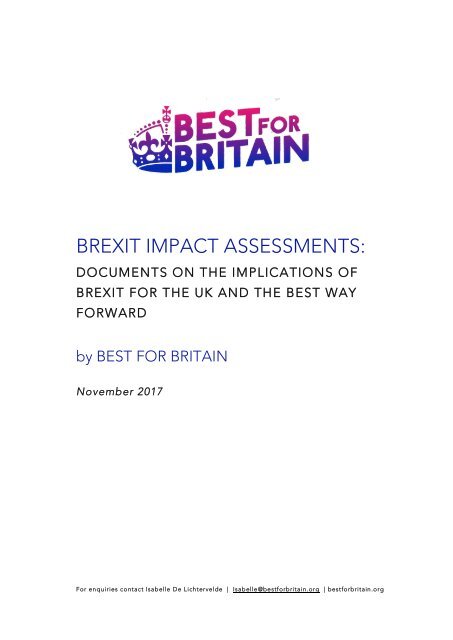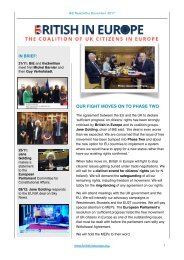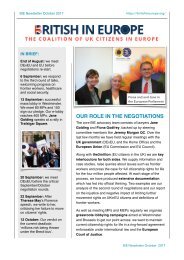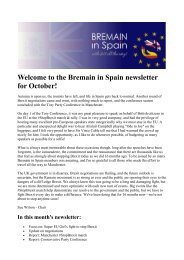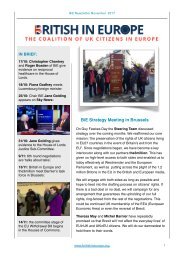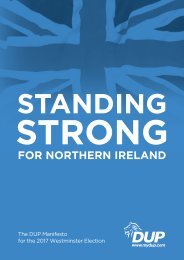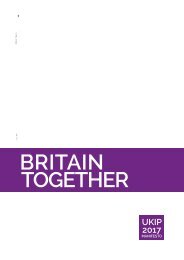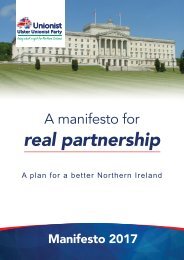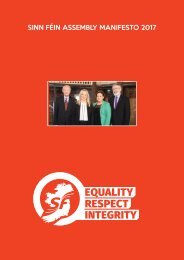Best for Britain Brexit-Reports-6.12.17-FINAL
Create successful ePaper yourself
Turn your PDF publications into a flip-book with our unique Google optimized e-Paper software.
BREXIT IMPACT ASSESSMENTS:<br />
DOCUMENTS ON THE IMPLICATIONS OF<br />
BREXIT FOR THE UK AND THE BEST WAY<br />
FORWARD<br />
by BEST FOR BRITAIN<br />
November 2017<br />
For enquiries contact Isabelle De Lichtervelde | Isabelle@best<strong>for</strong>britain.org | best<strong>for</strong>britain.org
2
Table of Contents<br />
Foreword………………………………………………………………………………..4<br />
Introduction……………………………………………………………………………5<br />
Examples of the implications of <strong>Brexit</strong> <strong>for</strong> the UK<br />
Overview: what would ‘no deal’ mean <strong>for</strong> people’s daily lives?……….…...7<br />
What would ‘no deal’ <strong>Brexit</strong> mean <strong>for</strong> the UK automotive industry?..........9<br />
What ‘no deal’ <strong>Brexit</strong> would mean <strong>for</strong> UK aviation..................................11<br />
What would ‘no deal’ <strong>Brexit</strong> mean <strong>for</strong> the UK Legal Services Industry?...13<br />
<strong>Brexit</strong>’s impact on the fight against extreme poverty...…………………….15<br />
What happened in the 2017 General Election<br />
The impact of the anti-<strong>Brexit</strong> tactical vote in 2017.…………………….……18<br />
The way <strong>for</strong>ward<br />
<strong>Brexit</strong> is not a done deal: Article 50 is revocable………………..…………..21<br />
Parliament must have a meaningful vote on the final <strong>Brexit</strong> deal….……..23<br />
Endnotes………………………………………………………………………………25<br />
3
Foreword<br />
The letter authored by David Lammy MP and Seema Malhotra MP sparked a cross-party<br />
uprising that <strong>for</strong>ced the government's hand on one of the most crucial issues in the <strong>Brexit</strong><br />
process. Unless MPs and citizens know what the impact of <strong>Brexit</strong> will truly be on the UK,<br />
Parliament and people will not be equipped to make the most important choice.<br />
It is vital that the people of the UK are able to understand the consequences of<br />
<strong>Brexit</strong>, because the biggest decision <strong>for</strong> the country is yet to come: Parliament<br />
will vote on the government's deal next autumn.<br />
For the government to hide and ignore unfavourable findings <strong>for</strong> political gain would be an act<br />
of un<strong>for</strong>givable recklessness.<br />
We have there<strong>for</strong>e decided to publish our own impact assessments. This volume includes<br />
analyses of the effect of ‘no deal’ on people’s everyday lives, on the automotive, aviation and<br />
legal services industries, and an analysis of the effects of <strong>Brexit</strong> on the fight against extreme<br />
poverty. We have also included some analysis of the impact of anti-<strong>Brexit</strong> tactical voting on the<br />
2017 General Election, of what a meaningful vote is and of the revocability of Article 50. These<br />
analyses map a way <strong>for</strong>ward which clearly shows that we can revoke Article 50 if the country<br />
wants to do so.<br />
We will continue to publish our own impact assessments to make sure citizens and MPs have<br />
in<strong>for</strong>mation on the real impact of <strong>Brexit</strong>. We all must make our voice heard when the<br />
deal comes to Parliament and push our MPs to do what is best <strong>for</strong> <strong>Britain</strong>.<br />
Eloise Todd, CEO, <strong>Best</strong> For <strong>Britain</strong><br />
4
Introduction<br />
As the <strong>Brexit</strong> clock is ticking and the negotiations between the UK government and the<br />
European Union (EU) are making very little progress, the prospect of a cliff-edge <strong>Brexit</strong> and all<br />
the chaos that would come with it has become increasingly likely. This report aims to give a<br />
snapshot of some of the implications that an Extreme <strong>Brexit</strong> would have <strong>for</strong><br />
Britons and the UK and outlines what <strong>Best</strong> For <strong>Britain</strong> considers the best way<br />
<strong>for</strong>ward.<br />
With the UK government announcing that it is preparing <strong>for</strong> all eventualities, including a 'no<br />
deal' 1 outcome, which would deliver an Extreme <strong>Brexit</strong>, this first section of this briefing clarifies<br />
what this scenario could mean <strong>for</strong> the UK and its people. The consequences of ‘no deal’<br />
would be far-reaching and would impact virtually every aspect of life in <strong>Britain</strong>.<br />
This note does not intend to be exhaustive; instead it gives examples of some of the severe<br />
implications it would have <strong>for</strong> the country. It first provides an overview of the impact of ‘no deal’<br />
<strong>Brexit</strong> on regular people’s lives. We then look specifically into the impact of Extreme <strong>Brexit</strong> on<br />
the aviation sector, the automotive sector, the legal services sector, and the fight against<br />
poverty in the world’s most vulnerable countries.<br />
The second part of this report discusses what really happened in the 2017 General Election,<br />
exploring the influence the anti-<strong>Brexit</strong> vote had on the final outcome. It summarises recent<br />
research suggesting that in many constituencies Remain voters supported the party most likely<br />
to beat the Conservatives (mostly Labour) and there<strong>for</strong>e boosted the Labour results.<br />
Lastly, this report argues that <strong>Brexit</strong> is not a done deal and presents the way in which it can be<br />
averted: revoking article 50 and securing a meaningful vote on the final deal, enabling MPs to<br />
reject any deals, including ‘no deal’.<br />
Theresa May has made much of her mantra that “no deal is better than a bad deal” but paid<br />
little attention to what this would actually mean <strong>for</strong> the UK. The impact on British people,<br />
especially the worst-off, would be devastating and long-lasting. <strong>Best</strong> For <strong>Britain</strong><br />
believes that no <strong>Brexit</strong> is better than a bad <strong>Brexit</strong> and that the most important<br />
decision is yet to come. People across the UK must be able to rely on their MPs to reject<br />
any deal that does not measure up as best <strong>for</strong> <strong>Britain</strong> - and if the new deal is not good enough,<br />
remaining a member of the European Union must be presented again to the country as one of<br />
the options. No one should have to sign a blank contract.<br />
5
Examples of the implications of <strong>Brexit</strong><br />
<strong>for</strong> the UK<br />
6
Overview: what would ‘no deal’ mean <strong>for</strong> people’s daily life?<br />
More than 4 million people 2 , including around 1 million Britons 3 , could lose their<br />
right to reside, work, and access essential services in their country of residence<br />
overnight.<br />
● Without any deal, the status of British citizens living in other EU countries and EU citizens<br />
living in the UK would be left in the hands of their host country government.<br />
UK consumers would be worse off, in particular poor families.<br />
● If the UK reverts to World Trade Organisations (WTO) tariffs, the price of clothing could rise<br />
by 2.4%, the price of vehicles by 5.5%, the price of dairy by 8.1% and the price of meat by<br />
5.8%.<br />
● 3.2 million families could see their annual spending rise by £500 or more. Poorer<br />
households are likely to be harder hit. 4<br />
● Further depreciation of the pound would lead to further inflation. The weaker pound since<br />
the EU referendum already led to rising food prices. Grocery inflation was above 3.1% in<br />
September 2017, the highest level of food price rises since October 2013. 5<br />
British exporters such as farmers and fishermen could no longer sell at<br />
competitive prices in the EU.<br />
● UK farmers exporting to the EU would face tariffs of between 30% and 40% on meat and<br />
dairy. Imports of agricultural inputs like fertiliser from the EU would also cost more.<br />
● UK fishermen would have access to their entire ‘Total Allowable Catch’ and EU member<br />
states would no longer have rights to fish in UK waters. However, British fishermen would<br />
also face tariffs to export fish and seafood to European countries, their largest export<br />
market, making it impossible <strong>for</strong> them to sell at competitive prices. 6 Grimsby fisherfolk have<br />
already asked <strong>for</strong> a special free trade status <strong>for</strong> seafood after <strong>Brexit</strong>. 7<br />
Traveling to British top holiday destinations in Europe would no longer be<br />
accessible to many.<br />
● From September 2016 to August 2017, UK residents visited Europe 57.6 million times. 8<br />
● Unlike trade, there is no WTO-like safety blanket <strong>for</strong> aviation and ‘no deal’ would unleash<br />
legal, regulatory and operational chaos. In the words of the UK Chancellor, it is not<br />
inconceivable that there will be “no air traffic moving between the UK and the EU”. 9<br />
● Under EU rules, any EU airline is able to fly between any two points in the EU 10 and<br />
agreements with non-EU countries allow EU airlines to fly to many destinations in the world,<br />
contributing to fares dropping by 40% since 1990 and the advent of budget airlines. 11<br />
Ryanair announced that, without a deal, flights would be cancelled. Easyjet is opening<br />
offices in Austria. 12<br />
● British travellers to EU countries would lose emergency health coverage that comes with<br />
the European Health Insurance Cards (EHIC).<br />
● Roaming charges in the EU were abolished. 13 This would cease to apply to the UK.<br />
● Currently Britons can drive freely within the EU with their UK driving license. Britons would<br />
have to apply <strong>for</strong> international driving permits to their holiday destinations.<br />
● There will be no more passports <strong>for</strong> pets enabling families to travel freely with their pets to<br />
Europe. Around 250,000 British cats and dogs travel to the EU every year. 14<br />
7
The NHS staff crisis would deepen and many people could lose their family<br />
doctor.<br />
● Approximately, 1 in 20 social and health workers in the UK are from EU countries. 15<br />
● According to NHS Digital, around 9,832 EU staff left the NHS in the 12 months following the<br />
EU referendum, including 3,885 nurses and 1,794 doctors. 16 40% of EU doctors are<br />
considering leaving and a further 25% are unsure about whether to stay. 17<br />
● The Royal College of General Practitioners warned that <strong>Brexit</strong> could lead to more than 3<br />
million patients across the UK losing their family doctor. 18<br />
·<br />
UK patients could lose access to modern drugs, life-saving cancer treatments<br />
and medical imaging.<br />
● Leaving Euratom with ‘no deal’ would mean the transportation of nuclear material to <strong>Britain</strong><br />
would cease. 19 This would put UK patients at risk of losing access to vital nuclear isotopes<br />
used in cancer treatments and medical imaging.<br />
● The UK would suddenly cease to be a member of the European Medicines Agency<br />
(currently based in London but set to move to Amsterdam after <strong>Brexit</strong>). In addition to its<br />
nearly 900 jobs leaving the UK, this could mean patients losing access to modern<br />
medicines. 20<br />
8
What would ‘no deal’ <strong>Brexit</strong> mean <strong>for</strong> the UK automotive industry?<br />
This briefing aims to show the implications of ‘no deal’ <strong>Brexit</strong>, or Extreme <strong>Brexit</strong>, <strong>for</strong> the car<br />
industry. It looks at our current terms and what a ‘no deal’ <strong>Brexit</strong> could mean <strong>for</strong> the industry.<br />
● The UK automotive industry relies on the frictionless and tariff-free<br />
European Single Market and Customs Union to operate.<br />
● The industry accounts <strong>for</strong> 12% of the total UK export of goods and employs<br />
814,000 people. 21<br />
● In the event of ‘no deal’, tariffs could increase the cost of imported cars by<br />
£1,500 on average. 22<br />
● The industry is already feeling the <strong>Brexit</strong> effect. Investment in <strong>Britain</strong>’s<br />
automotive industry has fallen by 75% in two years. 23<br />
● Ford is considering ceasing operations in the UK. This places 13,000 jobs at<br />
risk across the UK, 2,100 of which are in Bridgend making Ford one of the<br />
biggest employers in the area. 24<br />
● The iconic British car manufacturer, Aston Martin, has announced that if the<br />
government fails to secure a deal it may have to stop producing cars in the<br />
UK, putting 3,000 jobs at risk globally. 25<br />
What is the importance of the automotive industry to the UK economy?<br />
● Annually it generates a £71.6 billion turnover and adds £18.9 billion to the UK economy. 26<br />
● 1.72 million cars produced in the UK in 2016, record high since 1999. 27<br />
● 80% of cars produced in the UK are exported, 50% of which are exported to the EU. 28<br />
● Employs 169,000 people directly and 814,000 in the broader automotive sector. 29<br />
How does it currently work?<br />
The automotive industry is a prime example of the strong interdependent trade relationship<br />
between the UK and the EU, facilitated by the European Single Market and Customs Union.<br />
Production and distribution costs are slashed by no tariffs, no checks, no customs and<br />
frictionless borders. Additionally, within the EU, the UK influences EU regulatory policy,<br />
allowing the UK automotive industry to help shape the policies that govern them. Freedom of<br />
movement of goods, people and services is critical, allowing not only cars and parts to be<br />
imported and exported <strong>for</strong> free but also <strong>for</strong> the hiring of the best of the best from across<br />
Europe.<br />
Implications of ‘no deal’ <strong>Brexit</strong><br />
Leaving the EU without a deal would have a devastating impact on the UK car industry. Car<br />
manufacturers are very much aware of it, with 80% of big, medium and small sized car<br />
manufacturers wanting to stay in the EU, and only 10% backing leave. 30 ‘No deal’ would mean<br />
the end of free trade between the UK and the EU and falling back onto the unfavourable WTO<br />
rules. Under these rules <strong>Britain</strong> would have no preferential access to trade with the EU, with<br />
countries like Pakistan, Rwanda and Yemen trading on better terms with the EU than the UK. 31<br />
WTO rules would introduce tariffs, customs charges, friction-filled borders and remove our<br />
integrated global supply system. All of which would hit the car industry hard. The automotive<br />
9
industry relies on exporting goods <strong>for</strong> sale and importing parts <strong>for</strong> manufacturing, which often<br />
pass through several countries be<strong>for</strong>e they get to the UK. Under WTO rules, a customary 10%<br />
tariff would apply to all our car exports and a 4% tariff on car parts. 32 With the average car<br />
being made up of 30,000 different parts and 41% of parts being imported, a 4% tariff would<br />
cause the cost of production to rise quickly. 33 Analysis conducted by Society of Motor<br />
Manufacturers and Traders (SMMT) suggests tariffs on cars alone could add at least £2.7 billion<br />
annually to imports and £1.8 billion to exports. 34<br />
‘No deal’ would also hamper the UK’s ability to trade cars globally since the EU negotiates all<br />
Free Trade Agreements (FTA) <strong>for</strong> the EU28 collectively. By virtue of its EU membership, the UK<br />
benefits from 68 FTAs which on exit day would no longer apply. The Vehicle Certification<br />
Agency (VCA)’s approval, allowing UK-produced cars to be sold across the EU, would also no<br />
longer be valid. 35 Currently, all cars produced in the UK are tested and certified by the VCA.<br />
Finally, leaving the EU without a deal, or crashing out, would also end freedom of movement<br />
between the UK and the EU. This would prevent the automotive industry from retaining their<br />
competitive hiring practices. With freedom of movement, UK car companies can give equal<br />
opportunities to skilled workers from 28 different countries. Currently, 10% of UK automotive<br />
industry employees are from the EU27. The end of freedom of movement between the UK and<br />
the EU would cause a skills gap crisis <strong>for</strong> the sector. This is already being seen with 5,000 jobs<br />
presently vacant. 36<br />
Effects already being felt<br />
Pound deprecation because of <strong>Brexit</strong> and the knock on effects of inflation have killed consumer<br />
purchasing power. The car industry is already suffering the direct effects of this with a sevenmonth<br />
market slump and the lowest sales <strong>for</strong> four years. 37 Foreign investment in the car industry<br />
has also taken a hit due to lack of confidence and uncertainty. The first six months of 2017 saw<br />
<strong>for</strong>eign investment reduced by £322 million pounds, in comparison to £1.66 billion invested in<br />
2016 and £2.5 billion in 2015. 38<br />
Due to uncertainty, lack of progress with the negotiations and the high costs of ‘no deal’, car<br />
companies are already making contingency plans. Ford, the global automotive company, has<br />
already warned operations may have to stop in the UK if ‘the UK is not competitive’ after<br />
<strong>Brexit</strong>. 39 Key manufacturing sites like Ford Bridgend have already seen the 2,100 workers seek<br />
strike action over investment cuts and fears about the plant's future. 40 Ford has taken a huge hit<br />
since the referendum, with losses of $86 million in 2017 in comparison to profits of $138 million<br />
in 2016, which they say are “nearly completely explained by <strong>Brexit</strong> effects.” 41 The most recent<br />
automotive company to speak out saying they may have to stop producing cars in the UK was<br />
Aston Martin, who currently manufactures all their cars in the UK. This would put 2,500 jobs at<br />
risk in the UK and harm a UK luxury car industry worth £3.6 billion. 42<br />
‘No deal’ <strong>Brexit</strong> will significantly harm the UK’s key automotive industry. Big car<br />
companies are already threatening to leave the UK and jobs are at risk. This is<br />
not best <strong>for</strong> <strong>Britain</strong>.<br />
10
What ‘no deal’ <strong>Brexit</strong> would mean <strong>for</strong> UK aviation<br />
This briefing aims to show the implications of ‘no deal’ <strong>Brexit</strong>, or Extreme <strong>Brexit</strong>, <strong>for</strong> aviation. It<br />
looks at our current terms with the EU and what a ‘no deal’ <strong>Brexit</strong> could mean <strong>for</strong> the industry.<br />
UK aviation stands to be one of the biggest losers of ‘no deal’ <strong>Brexit</strong> : higher<br />
prices, restricted travel and possibly flights grounded.<br />
● EU rules are simple: any EU airline is able to fly between any two points<br />
in the EU. Agreements with non-EU countries allow EU airlines to fly to<br />
many destinations in the world.<br />
● This has contributed to fares dropping by 40% since 1990. In the case of<br />
‘no deal’, UK customers would likely see ticket prices surging again.<br />
● EU rules have facilitated the advent of budget airlines making travelling<br />
much more accessible to people with a smaller budget. 43 Ryanair<br />
announced that, in the case of ‘no deal’, flights would be cancelled. 44<br />
Easyjet has already announced that they are opening offices in Austria. 45<br />
● It could take a decade to create a sufficient UK equivalent to the agency<br />
that regulates safety and environmental protection in civil aviation in<br />
Europe.<br />
● Theoretically this could mean that in March 2019 planes will be<br />
grounded.<br />
What is the importance of aviation to the UK economy?<br />
● It contributes £60 billion to the economy annually, mostly through flights to and from<br />
Europe. 46<br />
● It employs nearly a million people. 47<br />
● It carries more than 250 million passengers annually, 135 million of which travel to the<br />
EU27. 48<br />
How does it currently work?<br />
Currently the UK is part of the European Common Aviation Area (ECAA), deemed by many as<br />
‘the world’s most liberal skies regime’ 49 , and of the European Aviation Safety Agency (EASA),<br />
which regulates safety and environmental protection in civil aviation in Europe. Under these<br />
rules, any airline owned by an EU national, which is fit and regulatory abiding, can fly anywhere in<br />
the EU, as frequently as it likes and charge as much as it likes. 50 Regarding travel to non-EU<br />
countries, the UK currently benefits from EU agreements with these countries. For example the<br />
EU-USA Open Skies Agreement allows any American or EU airline to fly to and from the EU and<br />
America. These agreements currently represent the UK’s flying privileges in 44 countries and<br />
85% of UK air travel. 51<br />
European integration of the aviation sector put an end to strict rules on routes, prices and<br />
passenger allowances. In the last two decades, flight routes within the EU have increased by<br />
303% 52 and fares are down by 40%. 53 The advent of budget airlines made travelling more<br />
af<strong>for</strong>dable and accessible. 54<br />
11
Implications of ‘no deal’ <strong>Brexit</strong><br />
‘No deal’ would be disastrous <strong>for</strong> the industry and <strong>for</strong> consumers. With plane schedules written<br />
roughly a year ahead of time, there would be ambiguity as early as March 2018 about when<br />
flights would stop running and whether airlines could still sell advance tickets. 55 Ryanair<br />
announced that they would “start moving aircraft away from September 2018”. 56 In the words of<br />
Philip Hammond, the UK Chancellor, it is not inconceivable that in March 2019 there will be “no<br />
air traffic moving between the UK and the European Union”. 57<br />
Leaving the EASA would unleash legal, regulatory and operational chaos as the UK currently has<br />
no domestic body to replace it. The Civil Aviation Authority (CAA), which oversees civil aviation<br />
in the UK, would be the most likely candidate to take over but is currently not equipped to do so.<br />
Trans<strong>for</strong>ming the CAA into EASA-like institution would require mass restructuring and increased<br />
staff numbers, all of which would require time (up to a decade 58 ) and a large cash injection. 59<br />
Losing access to the ECCA would significantly affect air travel. Unlike in the case of trade, there<br />
is no WTO-like safety-blanket <strong>for</strong> aviation. Until a deal is struck with EU countries, the UK would<br />
have to take a piecemeal approach to ensure that UK aviation can continue to function. The UK<br />
would have to rely on the International Civil Aviation Authority’s ‘Nine Freedoms of the Air’ 60<br />
which were established in 1944. 61 In the event of ‘no deal’ we may lose four of these. For<br />
example, as per freedom four ‘fly from a <strong>for</strong>eign country and land in the home country’, if you<br />
want to fly from Manchester to Milan you will have to use an Italian airline. 62 Since EU<br />
agreements with non-EU countries will also cease to apply, the UK would have to strike<br />
numerous new bilateral agreements. These agreements would likely be more rigid than what the<br />
UK is used to. 63 In the first instance the UK could fall back onto outdated bilateral agreements<br />
predating the ECCA. In the case of flying to the USA, the UK could fall back onto the Bermuda<br />
Agreements I & II from the 1940s and 1970s. However, these routes are very restrictive, so<br />
restrictive that you can only fly from London airports. 64<br />
In Conclusion, in the words of the General Secretary of the British Airline Pilots’<br />
Association (BALPA), “the entire UK aviation sector which employs nearly a<br />
million people and carries more than 250 million passengers per annum would be<br />
devastated by a <strong>Brexit</strong> ‘no deal’.” 65<br />
12
What would ‘no deal’ <strong>Brexit</strong> mean <strong>for</strong> the UK Legal Services<br />
Industry?<br />
This briefing aims to show the implications of ‘no deal’ <strong>Brexit</strong>, <strong>for</strong> UK legal services. It looks at<br />
our current terms with the EU and what a no deal <strong>Brexit</strong> could mean <strong>for</strong> the industry.<br />
UK Legal services would be heavily impacted by a ‘no deal’ <strong>Brexit</strong>,<br />
characterised by uncertainty around legal rulings and a sharp drop in business.<br />
● EU rules are simple: any qualified lawyer from an EU member state can<br />
work in any other member state with little restriction. 66<br />
● With their ability to practice across borders without restrictions and the<br />
dominance of English Law in commercial contracts, English lawyers are in<br />
high demand. Under a no deal scenario, UK lawyers would not be able to<br />
work as freely in the EU and the UK would lose significant business.<br />
● Rulings in one country are currently recognised by courts in other EU<br />
member countries. Because of fears that this reciprocity of jurisdiction<br />
would be lost, <strong>for</strong>eign businesses are already being discouraged from<br />
naming English courts in their commercial contracts, and the UK is likely<br />
to lose a large part of its appeal as a <strong>for</strong>um. 67<br />
What is the importance of the legal services sector to the UK economy?<br />
● It contributes £25.7bn to the economy 68 , generating 1.6% of UK GDP and a net export<br />
surplus of £3.1bn in 2013. 69<br />
● It employs 370,000 people. 70<br />
● It is one of the fastest growing sectors of the UK economy, growing 8% in 2015. 71<br />
How does it currently work?<br />
The UK has had considerable influence shaping EU directives that govern legal services. 72 Two<br />
EU regulations, known as ‘Rome I’ and ‘Rome II’, manage issues relating to which jurisdiction’s<br />
laws govern disputes and agreements from ordinary commercial disputes to intellectual<br />
property and competition law. 73 The ‘Brussels Recast’ ensures that rulings in one European<br />
country are automatically recognised by the courts of another. Without this provision, a<br />
judgement made by a UK court would be unen<strong>for</strong>ceable in another EU country. 74<br />
There are various other directives that permit lawyers to provide services and practise within<br />
the EU and provide <strong>for</strong> cross-border recognition of qualifications. UK lawyers have benefited<br />
significantly from freedom of movement that enables lawyers with EU/EEA nationality to<br />
establish and advise clients in other member states, without immigration controls or prior<br />
authorisations, and with cross-border recognition of qualifications. 75 The critical mass of<br />
experience and expertise of UK lawyers, as well as access to the EU market and litigation<br />
advantages of the UK courts has helped to establish the UK as a global leader. 76 As a result of<br />
its ability to practise across borders without restrictions and reciprocity of jurisdiction, English<br />
common law is the most popular system in the world, being applicable in 30% of the world’s<br />
320 legal jurisdictions. 77<br />
13
Implications of a no deal <strong>Brexit</strong><br />
The initial impact of the decision to leave the EU has in some ways been positive <strong>for</strong> the UK<br />
legal industry, with huge increases already seen in demand <strong>for</strong> lawyers as UK and international<br />
clients scramble to understand the impact of <strong>Brexit</strong> <strong>for</strong> their businesses, as well as establishing<br />
and interpreting laws that would allow the UK to function independently. 78 Some firms have<br />
appointed ‘Heads of <strong>Brexit</strong>’, whilst others have set up 24-hour hotlines <strong>for</strong> customers with<br />
queries. 79 The legal chaos of a ‘no deal’ <strong>Brexit</strong> would probably exacerbate this uncertainty.<br />
However, as the dust starts to settle, the picture will quickly start to change. With no deal, and<br />
hence restricted access to the single market and no reciprocity of jurisdiction, the UK is likely to<br />
lose its appeal as a global legal leader. 80 Without an agreement on reciprocity of jurisdiction,<br />
there would be a decline in the use of English law, and as <strong>Brexit</strong> impacts other areas of the UK<br />
economy (such as financial services, which accounts <strong>for</strong> 44% of deals amongst the Top 50 City<br />
law firms) businesses are likely to look to other jurisdictions <strong>for</strong> their legal services. 81 Indeed,<br />
this has already started to occur; there is anecdotal evidence that <strong>for</strong>eign businesses are being<br />
discouraged from naming UK courts in their contracts 82 , many companies are starting to<br />
register their lawyers in Ireland, and some firms are considering opening offices within EU<br />
jurisdiction and reducing the size of their UK offering. 83 For example, Amsterdam is opening an<br />
English law court styled by English qualified lawyers.<br />
A ‘no deal’ <strong>Brexit</strong> would also result in the loss of free movement of UK legal services. The ability<br />
to represent local clients in cases with EU connections would be lost, with British lawyers unable<br />
to practise or represent clients in the EU. The Chair of the Bar Council claimed that “without<br />
free movement of lawyers, nothing else of much importance will be salvaged”. 84<br />
To maintain stability and efficiency in the legal services sector, industry leaders<br />
have called <strong>for</strong> the government to commit to keeping existing provisions as<br />
much as possible. 85 With a ‘no deal’ <strong>Brexit</strong>, the legal services industry would<br />
face significant disruption and consequent loss of business to our competitors.<br />
14
<strong>Brexit</strong>’s impact on the fight against extreme poverty<br />
This briefing aims to show the implications of ‘no deal’ <strong>Brexit</strong>, or Extreme <strong>Brexit</strong>, <strong>for</strong> the quality<br />
and quantity of UK’s development cooperation.<br />
●<br />
●<br />
●<br />
●<br />
<strong>Brexit</strong> will significantly impact the quantity and quality of UK overseas aid.<br />
The 12% devaluation of the pound between the EU Referendum and the<br />
end of 2016 is equivalent to a loss of US$2.15 billion in the value of UK aid.<br />
Poor economic per<strong>for</strong>mance coupled with a weak pound means the<br />
commitment to spend 0.7% of national income on aid is worth less money.<br />
UK aid is likely to be shifted away from fighting poverty to focus more on<br />
national interests such as securing post-<strong>Brexit</strong> trade deals and security.<br />
Quantity of UK aid<br />
0.7% worth less - The Prime Minister confirmed that <strong>Britain</strong> will maintain its commitment to<br />
spend 0.7% of Gross National Income (GNI) on overseas aid. However, the post-<strong>Brexit</strong><br />
economic slowdown will have an impact on how much this commitment is worth. The Office <strong>for</strong><br />
Budget Responsibility (OBR) predicts that the economy will slow rapidly, as the UK increasingly<br />
heads towards an Extreme <strong>Brexit</strong>. In November 2017, OBR has downgraded its UK GDP growth<br />
<strong>for</strong>ecasts to just 1.5% in 2017, 1.4% in 2018 and only 1.3% in 2019 and 2020. 86 By 2030, the UK<br />
GDP could be 5.1% smaller than with continued EU membership, or even 7.7% smaller under a<br />
more pessimistic scenario. 87 If the UK GNI 88 had been 5.1% smaller in 2016, UK aid would have<br />
been £682 million less. If it had been 7.7% smaller, it would have been £1.03 billion less.<br />
Reduced value of UK aid - The devaluation of the pound has reduced the value of UK aid.<br />
Between the EU Referendum and the end of 2016, the pound devalued by 11.96%. UK aid<br />
totalled $18.01 billion in 2016. 89 As a result of the pound devaluation, by the end of 2016 UK aid<br />
had declined in value by 11.96%, amounting to a loss of $2.15 billion. The weaker pound has<br />
also reduced the value of remittances sent from the UK. The countries most dependent on UK<br />
remittances include Least Developed Countries such as Uganda, Kenya, Mauritius, South<br />
Africa, Nigeria, India, etc. 90<br />
Effective exchange<br />
rate index, Sterling<br />
(Jan 2005 = 100)<br />
Source: Bank of<br />
England<br />
15
Quality of UK aid<br />
Shifting of ODA allocations away from poverty eradication<br />
● Using aid to secure trade deals - In January 2017, the government published its new<br />
Economic Development Strategy. 91 The strategy puts a strong emphasis on encouraging<br />
trade and furthering national interests while encouraging economic growth in developing<br />
countries. Given the need to re-focus its <strong>for</strong>eign and trade policy away from the EU, the UK<br />
is very likely to use its aid to help secure post-<strong>Brexit</strong> trade deals. Priti Patel first floated this<br />
idea a year ago. She suggested aid could be a tool to win allies in the WTO. In October<br />
2017, she said again that aid could be used <strong>for</strong> “prosperity <strong>Britain</strong> post-<strong>Brexit</strong>, on trade and<br />
economic development.” 92<br />
● Reallocation of UK aid to other national priorities such as security - There has<br />
been a growing conflation of UK aid policy with national security interests. The crossgovernment<br />
Conflict, Stability and Security Fund saw its total budget significantly rise in<br />
recent years. 93 Priti Patel has also been pushing the OECD’s Development Assistance<br />
Committee to re-open the negotiations on the aid definition to include more security and<br />
military spending. 94 It was also recently revealed that she considered sending aid money to<br />
the Israeli army to support humanitarian operations in the Golan Heights. 95 This has led to<br />
her resignation.<br />
● Further ODA may be shifted away from DFID to other departments, that are<br />
less transparent and have less focus on poverty alleviation. A quarter of the aid budget<br />
(£3.5 billion) was spent by other departments than DFID in 2016. There has been increased<br />
use of cross-government funds, such as the Prosperity Fund, and the Conflict, Stability and<br />
Security Fund.<br />
Aid effectiveness - The EU is one of the most effective multilateral agencies, partly thanks to<br />
economies of scale and fewer fragmented demands on recipient governments. EU bodies have<br />
received high ratings in the UK Multilateral Aid Reviews. 96 UK aid money could be spent<br />
through less effective multilateral organisations, or will be spent bilaterally, reducing efficiency<br />
and increasing the burden on aid recipients.<br />
Global reach - The EU operates in 150 countries around the world. EU aid will be less<br />
aligned to UK development priorities and the UK will no longer benefit from the extensive<br />
reach of the EU globally. The EU is present in all 43 fragile states, while DFID has projects in<br />
only 11.<br />
16
What happened in the 2017 General<br />
Election<br />
17
The impact of the anti-<strong>Brexit</strong> tactical vote in 2017<br />
Summary of Dr Abigail Lebrecht report by <strong>Best</strong> <strong>for</strong> <strong>Britain</strong><br />
New research 97 points to how grassroots <strong>Brexit</strong>-related voting may have had a<br />
significant impact on the 2017 general election. A constituency-byconstituency<br />
analysis suggests that, while a significant number of leave voters<br />
appear to have switched to the Conservatives, many Remain voters supported<br />
the party in their constituency most likely to beat the Conservatives (mostly<br />
Labour). These new findings suggest that the Conservatives will struggle to<br />
win an election by relying solely on supporters of <strong>Brexit</strong>, while Labour could<br />
get closer to win a majority if it does more to attract anti-<strong>Brexit</strong> voters who<br />
are still backing the Conservatives.<br />
In recent YouGov polls 98 , 'other' is now more popular than Theresa May and Jeremy Corbyn as<br />
the UK's prime minister of choice. Yet only four months ago, both the Conservatives and<br />
Labour polled more votes than ever be<strong>for</strong>e. Has political feeling drastically changed in the UK<br />
since the election or was the election result not as straight<strong>for</strong>ward as it appeared? An answer<br />
can be found in research released by <strong>Best</strong> <strong>for</strong> <strong>Britain</strong> which shows the possible impact <strong>Brexit</strong>related<br />
voting had on the election and the lingering impact of the referendum on the British<br />
electoral landscape. 99<br />
The impact of grassroots <strong>Brexit</strong>-related voting in the 2017 general elections.<br />
The British Electoral Study (BES) 100 reported in August that 1 in 3 voters were most concerned<br />
about <strong>Brexit</strong> when voting and the <strong>Best</strong> <strong>for</strong> <strong>Britain</strong> model finds that around 30% of voters<br />
appeared to vote in line with their referendum vote.<br />
Looking at the 2015 result and the referendum result in each constituency, this research<br />
identifies a <strong>Brexit</strong>-related vote <strong>for</strong> both Remain and Leave voters. Significant numbers of leave<br />
voters appear to have switched to the Conservatives, but a constituency-by-constituency<br />
analysis suggests that many Remain voters supported the party in their constituency most likely<br />
to beat the Conservatives.<br />
For example, in Bristol North West (Lab: +16.2%; Con: -2.1%; LD: -1.0%; Lab gain from Con),<br />
which had a strong Remain vote in the referendum (61.1%) and where Labour won with a<br />
relatively small majority in 2017 (2017 Lab majority: 4,761; 2015 Con majority: 4,944), the<br />
evidence points to tactical voters <strong>for</strong> Labour, as well as Remain voters leaving the<br />
Conservatives, being likely to have delivered the seat <strong>for</strong> Labour. In contrast, in seats where<br />
there was another more pro-Remain party, Labour's vote increased much less than the national<br />
average (e.g. Ox<strong>for</strong>d West & Abingdon: LD: +14.8%; Con: -3.3%; Lab: -0.1%; LD gain from Con;<br />
2017 LD majority: 816; 2015 Con majority: 9,582; Remain votes: 61.8%).<br />
While UKIP voters joining the Conservatives was expected and well documented be<strong>for</strong>e the<br />
election, the organic flow of Remain voters to whoever the main challenger of the<br />
Conservatives was in their constituency as a stand against the Conservative <strong>Brexit</strong> has been<br />
underreported up until this point. With the evidence from our previous studies, the BES 101 and<br />
Ipsos Mori 102 post-election polls, we can conjecture with some confidence that the grassroots<br />
18
anti-<strong>Brexit</strong> vote may have not only denied Theresa May her majority but is also likely to have<br />
boosted the Labour Party's successful campaign.<br />
What conclusions can be drawn?<br />
Conservatives<br />
This research suggests that the Conservatives will struggle to win an election by relying solely<br />
on supporters of <strong>Brexit</strong>. Despite successfully appealing <strong>for</strong> the votes of previous UKIP<br />
supporters and other Leave voters, the grassroots anti-<strong>Brexit</strong> vote is likely to have denied the<br />
Conservatives their majority.<br />
Labour<br />
These new findings suggest that many voters may have picked Labour as the anti-<strong>Brexit</strong> vehicle<br />
in 2017. These voters are likely to have lent Labour their vote and not made a long-term<br />
commitment (yet). This suggests that by appealing to Remain voters Labour will likely be able<br />
to maintain and extend their gains made in 2017. According to Ipsos Mori 103 , Labour has the<br />
votes of 54% of Remain voters to hold onto in the next election. Meanwhile the Tories have<br />
26% of Remain voters still to lose.<br />
19
The Way Forward<br />
20
<strong>Brexit</strong> is not a done deal: Article 50 is revocable<br />
The UK’s triggering of Article 50 of the EU Lisbon Treaty in March 2017 started a two-year<br />
process after which <strong>Britain</strong> should leave the EU. However, prior to 29 March 2019 Article<br />
50 is revocable and <strong>Brexit</strong> is not inevitable. No <strong>Brexit</strong> is an option <strong>for</strong> the<br />
country.<br />
●<br />
●<br />
●<br />
●<br />
●<br />
●<br />
●<br />
The current government has stated that there is no way back from<br />
triggering Article 50.<br />
That reflects Conservative government policy, not legal fact or political<br />
reality.<br />
Article 50 does not prevent <strong>Britain</strong> from withdrawing its request to leave the<br />
EU.<br />
Legally, the letter from the UK government has only triggered the process,<br />
and Parliament will need to vote on the final deal.<br />
Politically, signals from EU leaders have made it clear that they would not<br />
stand in the way if the UK revoked Article 50 be<strong>for</strong>e March 2019.<br />
Lord Kerr 104 , author of Article 50, says that we can change our mind at any<br />
time be<strong>for</strong>e March 2019. The UK still has a choice on <strong>Brexit</strong>.<br />
The Government has a policy of not intending to revoke Article 50, but<br />
legally and politically, nothing should stop the withdrawal of Article 50 if<br />
that is what’s best <strong>for</strong> <strong>Britain</strong>.<br />
What is the government saying?<br />
The Government’s policy has been that Article 50 is a one-way ticket.<br />
● Prime Minister Theresa May said “there can be no turning back” from triggering Article<br />
50. 105<br />
● As a spokesperson <strong>for</strong> the Department <strong>for</strong> Exiting the European Union said "Government<br />
lawyers also made clear in legal proceedings be<strong>for</strong>e the High Court that, as a matter of firm<br />
policy, notification of withdrawal will not be withdrawn." 106<br />
● Former Justice Secretary Liz Truss said, "my understanding is that it is irrevocable." 107<br />
However the government distanced themselves from that claim in February 2017. 108<br />
● Secretary of State <strong>for</strong> Exiting the European Union, David Davis said "is it irrevocable? I<br />
don't know." 109<br />
What does the law say?<br />
Legally, nothing prevents the UK from withdrawing their Article 50 notice be<strong>for</strong>e the end of the<br />
two-year period.<br />
● As long as the UK hasn’t <strong>for</strong>mally left (currently in March 2019), there is nothing in Article 50<br />
indicating that the UK cannot change its mind. The text says that a state has left after the<br />
two-year negotiating period only. If it wants to re-join, it will need to apply like any third<br />
country and go through the whole membership process. 110<br />
● Article 50 provides <strong>for</strong> notification by a member state only of its “intention” to leave, not its<br />
decision. Legally, the word “intention” cannot be interpreted as a final and irreversible<br />
decision. You may withdraw an intention, change it, or trans<strong>for</strong>m it into a decision. 111<br />
21
● Lord Kerr, said that Article 50 is revocable. He told the BBC: "It is not irrevocable. You can<br />
change your mind while the process is going on.” 112<br />
● The House of Lords received legal advice saying that Article 50 was reversible. 113<br />
● Some believe that Article 50 is only revocable if all other EU member states agree, but this<br />
is a minority view; and even those who think this largely agree that the politics is more<br />
important than the legal position.<br />
● The Vienna Convention on the Law of Treaties provides that a notification of intention to<br />
withdraw from a treaty “may be revoked at any time be<strong>for</strong>e it takes effect.” 114<br />
What is the EU saying?<br />
Many EU leaders say that Article 50 is revocable:<br />
● When asked, in a joint press conference with Theresa May, whether the UK could withdraw<br />
its Article 50 notification during the two years, Emmanuel Macron said “until negotiations<br />
come to an end there is always a chance to reopen the door.” 115<br />
● When asked the same question, European Council President Donald Tusk said, "Formally,<br />
legally, yes." 116<br />
● President of the European Parliament said in April 2017, be<strong>for</strong>e the UK general election, “If<br />
the UK, after the election, wants to withdraw [Article 50], then the procedure is very clear... If<br />
the UK wanted to stay, everybody would be in favour. I would be very happy.” 117<br />
● Former German Finance Minister, Wolfgang Schäuble, concurs stating, “the British<br />
government has said we will stay with the <strong>Brexit</strong>… but if they wanted to change their<br />
decision, of course they would find open doors.” 118<br />
If the people want it, the UK can stop the <strong>Brexit</strong> process at any point be<strong>for</strong>e<br />
March 2019.<br />
22
Parliament must have a meaningful vote on the final <strong>Brexit</strong> deal<br />
The EU (Withdrawal) Bill must be amended to guarantee Parliament gets a<br />
meaningful vote on the final <strong>Brexit</strong> deal. MPs must support Amendment 7 to<br />
clause 9, to make exiting the EU “subject to the prior enactment of a statute<br />
by Parliament approving the final terms of withdrawal of the United Kingdom<br />
from the European Union.” 119<br />
A meaningful vote on <strong>Brexit</strong> must:<br />
● be on the final deal;<br />
● happen be<strong>for</strong>e the UK leaves the EU;<br />
● allow Parliament to reject all possible deals, including ‘no deal’, and<br />
enable it to reject more than one kind of deal.<br />
The government has verbally promised a meaningful vote on the final deal<br />
and stated that it will happen be<strong>for</strong>e we leave the EU. However, the<br />
Government’s ‘take it or leave it’ approach does not amount to a meaningful<br />
vote. As negotiations continue to stall and ‘no deal’ or a “virtual no deal”<br />
become a more likely outcome, it is increasingly clear that a truly meaningful<br />
vote needs to be enshrined in legislation. ‘No deal’ or a virtual ‘no deal’<br />
would mean an extreme <strong>for</strong>m of <strong>Brexit</strong> being delivered at huge cost to the UK,<br />
its services and its people’s prospects, especially the poorest and those living<br />
outside the South East.<br />
What constitutes a ‘meaningful vote’?<br />
● A meaningful vote must be on the final deal. A vote solely on a transitional deal,<br />
the divorce settlement and a loose sketch of the final deal would not be meaningful.<br />
Parliament must have the full <strong>Brexit</strong> picture.<br />
● Parliament must have the option to reject any deal, including ‘no deal’, and<br />
be able to reject more than one deal. Take it or leave it <strong>Brexit</strong> directly<br />
conflicts with having a meaningful vote. If parliament can’t <strong>for</strong>ce the government to<br />
renegotiate they have no option but to accept the deal, since ‘no deal’ would mean<br />
Extreme <strong>Brexit</strong> and would be worse than a ‘bad deal’.<br />
● To be meaningful, the vote must take place at least 6 months be<strong>for</strong>e the UK<br />
actually leaves the EU (currently March 29th, 2019). There<strong>for</strong>e, under the current<br />
timeline, a meaningful vote must be by October 2018, allowing enough time <strong>for</strong> the<br />
European Parliament and the necessary members states to approve it. 120<br />
● All options must remain on the table including ‘no <strong>Brexit</strong>’ <strong>for</strong> a vote to be<br />
meaningful. There must be a choice between <strong>Brexit</strong> and exploring a different deal with<br />
the EU. All attempts to enshrine <strong>Brexit</strong> in legislation should be avoided.<br />
Why is parliament entitled to a meaningful vote?<br />
Without a vote, allowing Parliament to reject all deals, Parliament cannot fulfil its sovereign<br />
duties. One of the main promises of the Leave campaign was to keep Parliament sovereign.<br />
Parliament should there<strong>for</strong>e have the final say on how or if we leave the EU.<br />
23
What the government is currently offering?<br />
Parliament has been promised a meaningful vote by government. In February 2017, David<br />
Jones MP, a Minister <strong>for</strong> the Department <strong>for</strong> Exiting the EU said:<br />
“we intend that the vote will cover not only the withdrawal arrangements but also the<br />
future relationship with the European Union. I can confirm that the Government will<br />
bring <strong>for</strong>ward a motion on the final agreement, to be approved by both Houses of<br />
Parliament be<strong>for</strong>e it is concluded. We expect and intend that this will happen be<strong>for</strong>e<br />
the European Parliament debates and votes on the final agreement.” 121<br />
However, what David Jones offered amounts to a take it or leave it <strong>Brexit</strong>:<br />
“it will be a meaningful vote. As I have said, it will be the choice between leaving the<br />
European Union with a negotiated deal or not.” 122<br />
In October 2017, the government placed a meaningful vote into question when David Davis MP<br />
responded to a question by Seema Malhotra MP about the meaningful vote process by saying:<br />
“It’s no secret that the way the union makes its decisions tends to be at the 59th minute<br />
of the 11th hour of the last day. That’s precisely what I would expect to happen<br />
here…” 123<br />
When Malhotra asked if the vote could come after the UK <strong>for</strong>mally exited the EU (under the<br />
current article 50 process timeline), he said: “Yes, it could be. It can’t come be<strong>for</strong>e we have the<br />
deal.” 124 These statements suggests that Davis is prepared <strong>for</strong> the negotiations to continue<br />
past the Article 50 deadline, meaning our membership to the EU would lapse, with no turning<br />
back, be<strong>for</strong>e Parliament can vote on a deal.<br />
MPs must vote <strong>for</strong> Amendment 7 to make sure Parliament is sovereign and has<br />
all options on the table when the final deal comes to the vote.<br />
24
Endnotes<br />
1<br />
‘No deal’ brexit means the UK leaving the EU with no agreement, or virtually no agreement, reached during the negotiations<br />
taking place under Article’50 of the Lisbon Treaty of the EU. By ‘no deal’, <strong>Best</strong> <strong>for</strong> <strong>Britain</strong> implies complete ‘no deal’ - the UK and<br />
the EU failing reach any agreement - as well as virtual ‘no deal’ - a few piecemeal agreements reached in some key areas but no<br />
overall deal.<br />
2<br />
Approximately 3.6 million EU citizens were living in the UK in 2016. Office <strong>for</strong> National Statistics (ONS), ‘Population of the UK by<br />
country of birth and nationality: 2016’,<br />
https://www.ons.gov.uk/peoplepopulationandcommunity/populationandmigration/internationalmigration/bulletins/ukpopulationb<br />
ycountryofbirthandnationality/2016#of-the-uk-population-1-in-7-were-born-abroad-and-1-in-11-had-non-british-nationality.<br />
3<br />
1.2 million people born in the UK live in other EU countries, according to 2015 UN estimates. United Nations, ‘International<br />
migrant stock 2015’, http://www.un.org/en/development/desa/population/migration/data/estimates2/estimates15.shtml<br />
Around 900,000 UK citizens were long-term residents in other EU countries in 2010 and 2011, according to census data from<br />
Eurostat and other European statistical offices collated by the ONS. ONS, ‘What in<strong>for</strong>mation is there on British migrants living in<br />
Europe?: Jan 2017’,<br />
https://www.ons.gov.uk/peoplepopulationandcommunity/populationandmigration/internationalmigration/articles/whatin<strong>for</strong>mation<br />
isthereonbritishmigrantslivingineurope/jan2017<br />
4<br />
Resolution Foundation, ‘Changing Lanes: The impact of different post-<strong>Brexit</strong> trading policies on the cost of living’, October 2017,<br />
http://www.resolutionfoundation.org/publications/changing-lanes/<br />
5<br />
ONS, ‘Inflation and price indices’, October 2017, https://www.ons.gov.uk/economy/inflationandpriceindices<br />
6 The UK in a changing Europe, ‘Cost of ‘no deal’, http://ukandeu.ac.uk/research-papers/cost-of-no-deal/<br />
7<br />
‘<strong>Brexit</strong> exemption sought <strong>for</strong> Grimsby seafood trade’, Grimbsy Telegraph, November 6 th, 2017,<br />
http://www.grimsbytelegraph.co.uk/news/grimsby-news/brexit-exemption-sought-grimsby-seafood-736984<br />
8<br />
ONS, ‘Overseas travel and tourism: August 2017 provisional results’, November 2017,<br />
https://www.ons.gov.uk/peoplepopulationandcommunity/leisureandtourism/bulletins/overseastravelandtourism/august2017<br />
9<br />
Jack Maidment and Steven Swin<strong>for</strong>d, ‘Flights between EU and UK could be suspended on day of <strong>Brexit</strong>, Philip Hammond claims’,<br />
Daily Telegraph, October 11 th , 2017,<br />
http://www.telegraph.co.uk/news/2017/10/11/philip-hammond-refuses-spend-money-now-prepare-britain-no-deal/<br />
10<br />
The UK in a changing Europe, ‘Cost of ‘no deal’, op. cit.<br />
11<br />
Alex Barker and Paul McClean, ‘Will <strong>Brexit</strong> complicate landing rights <strong>for</strong> UK flights?’, Financial Times, February 12 th , 2017,<br />
https://www.ft.com/content/57c0c01c-ef9c-11e6-930f-061b01e23655<br />
12<br />
Simon Calder, ‘Ryanair threatens to cancel flights between UK and EU after <strong>Brexit</strong>’, Independent, July 12 th , 2017,<br />
http://www.independent.co.uk/travel/news-and-advice/ryanair-brexit-michael-oleary-open-skies-eu-european-parliamenta7836511.html<br />
13<br />
European Commission, ‘Agreement to end roaming charges from June 2017’,<br />
https://ec.europa.eu/unitedkingdom/news/agreement-end-roaming-charges-june-2017_en<br />
14<br />
Quentin Aries, ‘Today at Commission, pet passports and <strong>Brexit</strong>’, Politico, March 30 th , 2017,<br />
https://www.politico.eu/blogs/playbook-plus/2017/03/today-at-commission-pet-passports-and-brexit/<br />
15<br />
‘NHSs Electronic Staff Record’, September 2015, data published on https://fullfact.org/immigration/immigration-and-nhs-staff/<br />
16<br />
‘Almost 10,000 EU health workers have quit NHS since <strong>Brexit</strong> vote’, Guardian, September 21 st, 2017,<br />
https://www.theguardian.com/society/2017/sep/21/almost-10000-eu-health-workers-have-quit-the-nhs-since-brexit-vote<br />
17<br />
Ibid<br />
18<br />
Nick Bostocak, ‘<strong>Brexit</strong> could <strong>for</strong>ce 2,137 GPs out of NHS, warns RCGP’, GP online, May 22 nd , 2017<br />
http://www.gponline.com/about?HAYILC=footer-link<br />
19<br />
Chris Giles and Alex Barker, ‘Hard or soft <strong>Brexit</strong>? The six scenarios <strong>for</strong> <strong>Britain</strong>’, Financial Times, June 23 rd , 2017,<br />
https://www.ft.com/content/52fb4998-573f-11e7-9fed-c19e2700005f?mhq5j=e5<br />
20<br />
‘<strong>Brexit</strong> threatens supply of new drugs, report warns’, Reuters, November 2 nd , 2016, http://www.reuters.com/article/us-britain-eupharmaceuticals/brexit-threatens-supply-of-new-drugs-report-warns-idUSKBN12X121<br />
21 Josh Harris, ‘SMMT Response: Legislating <strong>for</strong> the UK’s withdrawal from the EU - great repeal bill white paper’, SMMT, June 2017,<br />
https://www.smmt.co.uk/wp-content/uploads/sites/2/SMMT-response-to-Legislating-<strong>for</strong>-the-United-Kingdoms-withdrawal-fromthe-European-Union.pdf<br />
Alan Tovey, ‘<strong>Britain</strong>'s luxury car industry at risk without <strong>Brexit</strong> deal’, Daily Telegraph, October 17 th , 2017,<br />
http://www.telegraph.co.uk/business/2017/10/17/britains-luxury-car-industry-risk-without-brexit-deal/<br />
22<br />
‘Industry topics: <strong>Brexit</strong>’, SMMT, https://www.smmt.co.uk/industry-topics/brexit/<br />
23<br />
Elizabeth Perlman, ‘Ford’s Europe president: We could leave the UK because of <strong>Brexit</strong>’, Verdict, November 7 th , 2017,<br />
https://www.verdict.co.uk/<strong>for</strong>d-europe-brexit-car-industry/<br />
24<br />
Ford, ‘Ford Careers’, Ford, https://www.<strong>for</strong>d.co.uk/experience-<strong>for</strong>d/careers<br />
Jonathan Walker, ‘Car firms employing more than 16,000 say <strong>Brexit</strong> could do huge damage to their businesses’, Birmingham Mail,<br />
November 13 th , 2017, http://www.birminghammail.co.uk/news/midlands-news/car- firms-employing -more-16000-13894515<br />
Bridgend County Borough Council, ‘Bridgend County Borough Profile - 2017’, Bridgend County Borough Council,<br />
http://business.bridgend.gov.uk/en/about-the-borough/bridgend-profile/<br />
25<br />
Ned Simons, ‘Aston Martin Warns It Could Have To Stop Making Cars If <strong>Brexit</strong> Talks Fail’, Huffington Post, November 14 th , 2017,<br />
http://www.huffingtonpost. co.uk/entry/aston-martin-warns-it-could-have-to-stop-making-cars-if-brexit-talks-<br />
25
fail_uk_5a0afc58e4b0bc648a0dd499?ncid=APPLENEWS00001 and Aston Martin Press office, ‘employment figures’, Aston Martin,<br />
15 November 2017<br />
26<br />
Alan Tovey, ‘<strong>Britain</strong>'s luxury car industry at risk without <strong>Brexit</strong> deal’, op.cit<br />
27<br />
Ibid.<br />
28<br />
David Bailey, ‘What does <strong>Brexit</strong> mean <strong>for</strong> the UK’s automotive industry?’, The UK in a Changing EU, July 25 th , 2016,<br />
http://ukandeu.ac.uk/what-does-brexit-mean-<strong>for</strong>-the-uks-automotive-industry/<br />
29<br />
Josh Harris, ‘SMMT Response: Legislating <strong>for</strong> the UK’s withdrawal from the EU - great repeal bill white paper’, SMMT, June 2017,<br />
https://www.smmt.co.uk/wp-content/uploads/sites/2/SMMT-response-to-Legislating-<strong>for</strong>-the-United-Kingdoms-withdrawal-fromthe-European-Union.pdf<br />
Alan Tovey, ‘<strong>Britain</strong>'s luxury car industry at risk without <strong>Brexit</strong> deal’, op.cit<br />
30<br />
David Conn, ‘UK car industry facing an 'utterly demoralising' <strong>Brexit</strong>’, Guardian, August 4 th , 2017,<br />
https://www.theguardian.com/business/2017/aug/04/uk-car-industry-facing-an-utterly-demoralising-brexit<br />
31<br />
Andrew Grice, ‘Leaked Treasury report warns of painful “economic shock” if <strong>Britain</strong> crashes out of the EU without a deal’,<br />
Independent, March 11 th , 2017, http://www.independent.co.uk/news/uk/politics/brexit-treasury-fears-leaked-document-article-50-<br />
theresa-may-eu-referendum-exclusive-a7624706.html<br />
32<br />
Will Dunn, ‘After <strong>Brexit</strong>, we should just let the UK car factories close’, New Statesman, July 3 rd , 2017,<br />
https://www.newstatesman.com/politics/brexit /2017/07/after-brexit-we-should-just-let-uk-car-factories-close and Jacob Hanke<br />
Joshua Posaner, ‘Automakers: UK car industry will stall without <strong>Brexit</strong> deal’, Politico, August 17 th , 2017,<br />
https://www.politico.eu/article/interview-uk-car-industry-will-stall-if-theresa-may-walks-away-from-deal/<br />
33<br />
Jacob Hanke and Joshua Posaner, ‘Automakers: UK car industry will stall without <strong>Brexit</strong> deal’, op.cit<br />
Peter Campbell and Michael Pooler ‘<strong>Brexit</strong> triggers a great car parts race <strong>for</strong> UK auto industry’, Financial Times, July 30 th , 2017,<br />
https://www.ft.com/content/b56d0936-6ae0-11e7-bfeb-33fe0c5b7eaa<br />
34<br />
SMMT, ‘Industry topics: <strong>Brexit</strong>’, op.cit<br />
35<br />
Ned Simons, ‘Aston Martin Warns It Could Have To Stop Making Cars If <strong>Brexit</strong> Talks Fail’ op.cit<br />
36<br />
SMMT, ‘Industry topics: <strong>Brexit</strong>’, op.cit<br />
37<br />
‘Double digit decline <strong>for</strong> UK car market in October as government urged to restore confidence in new cleaner diesels’, SMMT,<br />
November 6 th , 2017, https://www.smmt.co.uk/2017/11/double-digit-decline-uk-car-market-october-government-urged-restoreconfidence-new-cleaner-diesels/<br />
38<br />
David Conn, ‘UK car industry facing an 'utterly demoralising' <strong>Brexit</strong>’, op.cit<br />
39<br />
Elizabeth Perlman, ‘Ford’s Europe president: We could leave the UK because of <strong>Brexit</strong>’, op.cit<br />
40<br />
Peter Campbell and James Pickard, ‘Ford plans to cut more than 1,100 jobs at UK’s Bridgend plant’, Financial Times, March 1 st ,<br />
2017, https://www.ft.com/content/231e7c4c-fe9b-11e6-8d8e-a5e3738f9ae4<br />
41<br />
Elizabeth Perlman, ‘Ford’s Europe president: We could leave the UK because of <strong>Brexit</strong>’, op.cit<br />
42<br />
Aston Martin Press office, ‘employment figures’ op.cit<br />
Alan Tovey, ‘<strong>Britain</strong>'s luxury car industry at risk without <strong>Brexit</strong> deal’, op.cit<br />
43 Alex Barker and Paul McClean, ‘Will <strong>Brexit</strong> complicate landing rights <strong>for</strong> UK flights?’, Financial Times, February 12 th , 2017,<br />
https://www.ft.com/content/57c0c01c-ef9c-11e6-930f-061b01e23655<br />
44<br />
Simon Calder, ‘Ryanair threatens to cancel flights between UK and EU after <strong>Brexit</strong>’, Independent, July 12 th , 2017,<br />
http://www.independent.co.uk/travel/news-and-advice/ryanair-brexit-michael-oleary-open-skies-eu-european-parliamenta7836511.html<br />
45 Simon Calder, ‘Easyjet is setting up a separate airline in Vienna ready <strong>for</strong> <strong>Brexit</strong>’, Independent, July 14 th , 2017,<br />
http://www.independent. co.uk/travel/news-and-advice/easyjet-europe-headquarters-vienna-brexit-luton-london-stelios-budgetairline-uk-leave-eu-a7840461.html<br />
46 Ibid<br />
47 BALPA, “BALPA says a <strong>Brexit</strong> ‘no deal’ would spell disaster <strong>for</strong> UK aviation”, October 10 th , 2017, http://www.balpa.org/Media-<br />
Centre/Press-Releases/BALPA-says-a-<strong>Brexit</strong>-‘no-deal’-would-spell-disaster<br />
48 BALPA, “BALPA says a <strong>Brexit</strong> ‘no deal’ would spell disaster <strong>for</strong> UK aviation”, op.cit.<br />
David M. Herszenhorn, ‘What happens at the <strong>Brexit</strong> cliff-edge’, Politico, October 19 th , 2017, http://www.politico.eu/article/brexitwhat-happens-at-brexit-cliff-edge/<br />
49 Alex Barker and Paul McClean, ‘Will <strong>Brexit</strong> complicate landing rights <strong>for</strong> UK flights?’, op.cit.<br />
50 The UK in a changing Europe, ‘Cost of ‘no deal’, op. cit.<br />
51 Institute <strong>for</strong> Government, ‘Aviation and European Common Aviation Area’, August 14 th , 2017,<br />
https://www.institute<strong>for</strong>government.org.uk/explainers/european-common-aviation-area-ecaa-brexit-explained<br />
52 Institute <strong>for</strong> Government, ‘Aviation and European Common Aviation Area’, op.cit.<br />
53 Alex Barker and Paul McClean, ‘Will <strong>Brexit</strong> complicate landing rights <strong>for</strong> UK flights?’, op.cit.<br />
54 Ibid<br />
55 BALPA, “BALPA says a <strong>Brexit</strong> ‘no deal’ would spell disaster <strong>for</strong> UK aviation”, op.cit.<br />
56<br />
Simon Calder, ‘Ryanair threatens to cancel flights between UK and EU after <strong>Brexit</strong>’, op.cit.<br />
57 Jack Maidment and Steven Swin<strong>for</strong>d, ‘Flights between EU and UK could be suspended on day of <strong>Brexit</strong>, Philip Hammond claims’,<br />
op.cit<br />
http://www.telegraph.co.uk/news/2017/10 /11/philip-hammond-refuses-spend-money-now-prepare-britain-no-deal/<br />
58<br />
Alex Derber, ‘EASA After <strong>Brexit</strong>’, MRO Network, August 11 th , 2016, http://www.mro-network.com/safety-regulatory/easa-afterbrexit<br />
59<br />
Institute <strong>for</strong> Government, ‘Aviation and European Common Aviation Area’, op.cit.<br />
26
60 ICAO, ‘Freedoms of the Air’, ICAO, https://www.icao.int/Pages/freedomsAir.aspx<br />
61<br />
These freedoms were established to define commercial aviation rights. There are very few instances where all nine freedoms are<br />
adopted, which would be the most liberal approach to aviation, one example is the European Single Market.<br />
62 Institute <strong>for</strong> Government, ‘Aviation and European Common Aviation Area’, op.cit<br />
63<br />
The UK in a changing Europe, ‘Cost of ‘no deal’, op.cit.<br />
64<br />
Richard Corbett, ‘<strong>Brexit</strong> and Aviation’, Richard Corbett, http://www.richardcorbett.org.uk/brexit-and-aviation/<br />
65<br />
BALPA, “BALPA says a <strong>Brexit</strong> ‘no deal’ would spell disaster <strong>for</strong> UK aviation”, op.cit.<br />
66<br />
European Commission, ‘Professions falling under specific legislation’, http://ec.europa.eu/growth/single-market/services/freemovement-professionals/qualifications-recognition/specific-legislation_en<br />
67<br />
Katie King, ‘House of Lords fears <strong>Brexit</strong> uncertainty is already having a detrimental impact on UK legal services’, Legal Cheek,<br />
March 20 th , 2017, https://www.legalcheek.com/2017/03/house-of-lords-fears-brexit-uncertainty-is-already-having-a-detrimentalimpact-on-uk-legal-services/<br />
68<br />
The Law Society of England and Wales, ‘Court gridlock warning as government ponders ‘no deal’, November 2 nd , 2017,<br />
http://www.lawsociety.org.uk/news/press-releases/court-gridlock-warning-as-government-ponders-no-deal/<br />
69<br />
The Law Society of England & Wales, ‘The EU and the Legal Sector’, October 2015,<br />
https://www.lawsociety.org.uk/news/documents/the-uk-legal-services-sector-and-the-eu/<br />
70<br />
House of Commons Justice Committee, ‘Implications of <strong>Brexit</strong> <strong>for</strong> the justice system’, March 22 nd , 2017,<br />
https://publications.parliament.uk/pa/cm201617/cmselect/cmjust/750/750.pdf<br />
71<br />
Jon Stone, ‘<strong>Brexit</strong> free movement restrictions would ruin <strong>Britain</strong>’s 26bn legal services industry, country’s top lawyers warn’,<br />
Independent, February 1 st ,2017, http://www.independent.co.uk/news/uk/politics/brexit-effect-on-exports-legal-industry-freemovement-lawyers-a7556836.html<br />
72<br />
Katie King, ‘House of Lords fears <strong>Brexit</strong> uncertainty is already having a detrimental impact on UK legal services’, op.cit.<br />
73<br />
Tom Spiller, ‘<strong>Brexit</strong> and the British Legal sector: uncertainties, solutions and jewels in crowns’, Rosenblatt, May 10 th , 2017,<br />
http://rosenblatt-law.co.uk/brexit-and-the-british-legal-sector/<br />
74<br />
Harry Cooper, ‘<strong>Brexit</strong> threat to London’s legal eagles’, Politico, August 16 th , 2017, https://www.politico.eu/article/court-chaos-<strong>for</strong>post-brexit-europe/<br />
75<br />
House of Commons Justice Committee, ‘Implications of <strong>Brexit</strong> <strong>for</strong> the justice system’, op.cit.<br />
Bar Council <strong>Brexit</strong> Working Group, ‘Access to the Legal Services Market Post-<strong>Brexit</strong>’, The General Council of the Bar, March 2017,<br />
http://www.barcouncil.org.uk/media/557733/paper_1_legal_services.pdf<br />
76<br />
ibid.<br />
77<br />
Tom Spiller, ‘<strong>Brexit</strong> and the British Legal sector: uncertainties, solutions and jewels in crowns’, op.cit.<br />
78<br />
Sion Evans, ‘How will <strong>Brexit</strong> affect the legal services market?’, Idex Consulting, July 19 th , 2017,<br />
https://www.idexconsulting.com/blog/how-will-brexit-affect-the-legal-services-market-72131146419<br />
79<br />
Sion Evans, ‘How will <strong>Brexit</strong> affect the legal services market?’, op.cit.<br />
80<br />
The Law Society of England and Wales, ‘The EU and the Legal Sector’, op.cit.<br />
81<br />
ibid.<br />
82<br />
Katie King, ‘House of Lords fears <strong>Brexit</strong> uncertainty is already having a detrimental impact on UK legal services’, op.cit.<br />
83<br />
Sion Evans, ‘How will <strong>Brexit</strong> affect the legal services market?’, op.cit.<br />
84<br />
House of Commons Justice Committee, ‘Implications of <strong>Brexit</strong> <strong>for</strong> the justice system’, op.cit.<br />
85<br />
House of Commons Justice Committee, ‘Implications of <strong>Brexit</strong> <strong>for</strong> the justice system’, op.cit.<br />
86<br />
OBR, ‘Overview of the November 2017 Economic and Fical Outlookd, November 20 th’ , 2017,<br />
http://budgetresponsibility.org.uk/overview-of-the-november-2017-economic-and-fiscal-outlook/<br />
87<br />
OECD, ‘The Economic Consequences of <strong>Brexit</strong>: A Taxing Decision’, April 2016, http://www.oecd.org/eco/the-economicconsequences-of-brexit-a-taxing-decision.htm<br />
88<br />
Because of data availability, <strong>Best</strong> <strong>for</strong> <strong>Britain</strong> assumes GNI growth equals GDP growth.<br />
89<br />
OECD DAC Preliminary Figures <strong>for</strong> 2016<br />
90<br />
ODI, ‘<strong>Brexit</strong> and development: How will developing countries be affected?’, July 2016,<br />
https://www.odi.org/sites/odi.org.uk/files/resource-documents/10685.pdf<br />
91<br />
DFID, ‘Economic Development Strategy: prosperity, poverty and meeting global challenges’, January 2017,<br />
https://www.gov.uk/government/uploads/system/uploads/attachment_data/file/587374/DFID-Economic-Development-Strategy-<br />
2017.pdf<br />
92 Rob Merrick , ‘Foreign aid to be spent on helping to secure post-<strong>Brexit</strong> trade deals, Priti Patel says’, Independent, October 24 th ,<br />
2017, http://www.independent.co.uk/news/uk/politics/brexit-latest-<strong>for</strong>eign-aid-spent-trade-deals-priti-patel-internationaldevelopment-secretary-a8017796.html<br />
93<br />
UKAN, ‘The State of UK Aid 2017, http://www.ukan.org.uk/wordpress/wp-content/uploads/2017/07/UKAN-State-of-UK-Aid-<br />
Report-AW-online.pdf<br />
94 Molly Anders, ‘UK's bid to change aid rules 'not up <strong>for</strong> discussion,’ says DAC chief’, Devex, June 29 th , 2017<br />
https://www.devex.com/news/uk-s-bid-to-change-aid-rules-not-up-<strong>for</strong>-discussion-says-dac-chief-<br />
90574?utm_source=website&utm_medium=box&utm_campaign=linking_strategy<br />
95<br />
‘Priti Patel clinging on after details of more Israel meetings emerge’, Guardian, November 7 th , 2017,<br />
https://www.theguardian.com/world/2017/nov/07/priti-patel-wanted-to-send-aid-money-to-israeli-army-no-10-confirms<br />
96<br />
DFID, ‘Raising the standard: the Multilateral Development Review 2016’, December 2016,<br />
https://www.gov.uk/government/uploads/system/uploads/attachment_data/file/573884/Multilateral-Development-Review-<br />
Dec2016.pdf<br />
27
97<br />
Abigail Lebrecht, ‘The Impact of the anti-<strong>Brexit</strong> tactical vote in 2017’,<br />
https://best<strong>for</strong>britain.org/static/best/pdf/Tactical_Voting_2017.pdf<br />
98<br />
YouGov, 10 th & 11 th October 2017 Polling,<br />
https://d25d2506sfb94s.cloudfront.net/cumulus_uploads/document/ptmrf0v5kz/Timesresults_171011_VI_Trackers.pdf,<br />
YouGov, 7 th & 8 th November 2017 Polling,<br />
https://d25d2506sfb94s.cloudfront.net/cumulus_uploads/document/t7a4lpcsdh/TimesResults_171108_VI_Trackers.pdf<br />
99<br />
This analysis only looks at election results <strong>for</strong> England and Wales (as Scotland had a completely different tactical voting<br />
programme and a Conservative party putting out a less uncompromising line on <strong>Brexit</strong>).<br />
100<br />
Ed Fieldhouse and Chris Prosser, ‘The <strong>Brexit</strong> election? The 2017 General Election in ten charts’, The British Election Study Team,<br />
August 1 st , 2017, http://www.britishelectionstudy.com/bes-impact/the-brexit-election-the-2017-general-election-in-tencharts/#.Wh6fn9PyhAZ<br />
101<br />
‘2017 Election BES Internet Panel Data Released’, The British Election Study, August 1 st , 2017,<br />
http://www.britishelectionstudy.com/bes-resources/2017-election-bes-internet-panel-data-released/#.Wh6gntPyhAZ<br />
102<br />
‘How the voters voted in the 2017 elections’, Ipsos MORI estimates https://www.ipsos.com/sites/default/files/2017-06/howbritain-voted-in-the-2017-election_2.pdf<br />
103<br />
Ibid<br />
104<br />
Lord Kerr was secretary-general of the European convention, which drafted what became the Lisbon treaty.<br />
105<br />
Katie Martin, ‘May: ‘There can be no turning back’ as Article 50 triggered’, Financial Times, March 29 th , 2017,<br />
https://www.ft.com/content/96930b9e-627d-321a-b585-e167192efb2a<br />
106<br />
Glenn Campbell, ‘Article 50 author Lord Kerr says <strong>Brexit</strong> not inevitable’, BBC, November 3 rd , 2016,<br />
http://www.bbc.co.uk/news/uk-scotland-scotland-politics-37852628<br />
107<br />
‘Reality Check: Can the UK change its mind on Article 50?’, BBC, March 29 th , 2017, http://www.bbc.co.uk/news/uk-politics-<br />
39291512<br />
108<br />
Adam Bienkov, ‘The UK government refuses to repeat Liz Truss' claim that Article 50 is 'irrevocable'’, Business Insider, February<br />
20 th , 2017, http://uk.businessinsider.com/article-50-liz-truss-irrevocable-theresa-may-brexit-lord-kerr2017-2<br />
109<br />
Reality Check: Can the UK change its mind on Article 50?, BBC, op.cit.<br />
110<br />
Article 50 of the Lisbon Treaty http://www.lisbon-treaty.org/wcm/the-lisbon-treaty/treaty-on-European-union-andcomments/title-6-final-provisions/137-article-50.html<br />
111 Jean-Claude Piri, ‘Article 50 is not <strong>for</strong> ever and the UK could change its mind’, Financial Times, September 1 st , 2016,<br />
https://www.ft.com/content/b9fc30c8-6edb-11e6-a0c9-1365ce54b926<br />
112<br />
Glenn Campbell, ‘Article 50 author Lord Kerr says <strong>Brexit</strong> not inevitable’, op.cit<br />
113<br />
House of Lords, European Union Committee, ‘The process of withdrawing from the European Union’, May 2016,<br />
https://publications.parliament.uk/pa/ld201516/ldselect/ldeucom/138/138.pdf<br />
114<br />
Vienna Convention on the law of treaties. Concluded at Vienna on 23 May 1969<br />
https://treaties.un.org/doc/publication/unts/volume%201155/volume-1155-i-18232-english.pdf<br />
115<br />
Jessica Elgot and Anushka Asthana, ‘Emmanuel Macron says door to remain in EU is open to <strong>Britain</strong>’, Guardian, June 13 th , 2017,<br />
https://www.theguardian.com/politics/2017/jun/13/brexit-talks-to-start-next-week<br />
116<br />
‘Reality Check: Can the UK change its mind on Article 50?’, BBC, op.cit<br />
117<br />
Dan Roberts and Lisa O'Carroll, ‘EU leader: UK would be welcomed back if voters overturn <strong>Brexit</strong>’, Guardian, April 20 th , 2017,<br />
https://www.theguardian.com/politics/2017/apr/20/european-parliament-will-welcome-britain-back-if-voters-veto-brexit<br />
118<br />
Cynthia Kroet, ‘Wolfgang Schäuble: EU door remains open to UK’, June 13 th , 2017, https://www.politico.eu/article/wolfgangschauble-eu-door-remains-open-to-uk/<br />
119<br />
House of Commons, ‘European Union (Withdrawal) Bill: Amendment 7 to Clause 9, page 6, line 45’, House of Commons, 30<br />
October 2017, https://publications.parliament.uk/pa/bills/cbill/2017-2019/0005/amend/euwithdrawal_rm_cwh_1030.pdf#page=[82]<br />
120<br />
Stephen Bush, ‘Is a “meaningful” Commons vote on the <strong>Brexit</strong> deal even possible?’, New Statesman, November 14 th , 2017,<br />
https://www.newstatesman.com/politics/staggers/2017/11/meaningful-commons-vote- brexit-deal-even-possible<br />
121<br />
David Jones, ‘European Union (Notification of Withdrawal) Bill: Vol 621’, House of Commons Hansard, February 7 th , 2017,<br />
https://goo.gl/MbHwbo<br />
122<br />
Ibid<br />
123<br />
Heather Stewart and Rajeev Syal, ‘David Davis says he ‘expects and intends’ Commons vote on <strong>Brexit</strong> deal’, Guardian, October<br />
25 th , 2017,<br />
https://www.theguardian.com/politics/2017/oct/25/david-davis-mps-might-not-get-vote-on-final-deal-until-after-brexit<br />
124<br />
Heather Stewart, ‘Tory rebels warn they are 'deadly serious' about <strong>for</strong>cing <strong>Brexit</strong> concessions’, Guardian, October 26 th , 2017,<br />
https://www.theguardian.com/politics/2017/oct/26/government-in-a-mess-over-brexit-says-keir-starmer<br />
28


